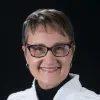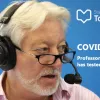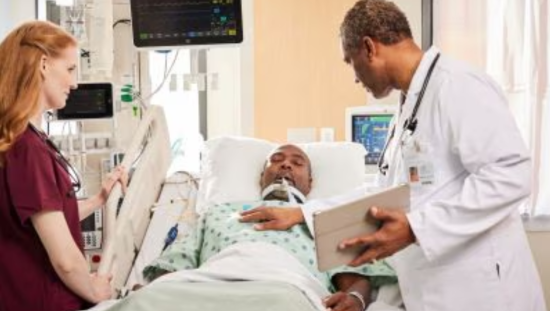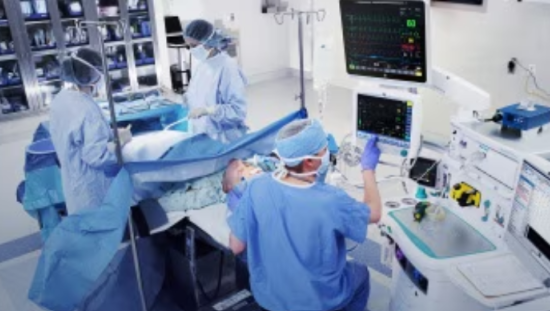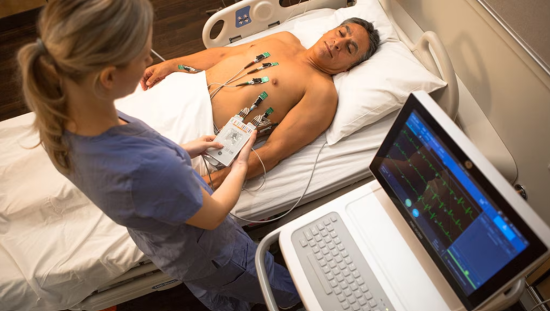#3. Enhanced Recovery
Lynn Reede, Associate Clinical Professor, Northeastern University Nurse Anesthesia Program, talks about Enhanced Recovery and The American Association of Nurse Anesthetists (AANA) 2019 Annual Congress in Chicago, Illinois.
Show Notes
Transcript
Speakers
Learn more about Enhanced Recovery and The American Association of Nurse Anesthetists (AANA) with Lynn Reede, DNP, MBA, CRNA.
This podcast was recorded by TopMedTalk on The American Association of Nurse Anesthetists (AANA) 2019 Annual Congress in Chicago, Illinois. Listen to this podcast from the TopMedTalk platform here.
TopMedTalk.
Nick Margerrison: Nick Margerrison here. This piece is taken from the American Association Nurse Anesthetist Annual Conference last year. Don't forget, of course, the AANA 2020 Annual Conference at the San Diego Convention Center. Still has tickets available. Don't forget to check aana.com/meetings for more details. That's aana.com/meetings. Hope you enjoy the podcast.
Desiree Chappell: Well hello, I'm Desiree Chappell and this is TopMedTalk. We're coming to you live from the American Association Nurse Anesthetist 2019 Annual Congress in Chicago, Illinois. AANA 2019 is a gathering of over 3,000 certified Registered Nurse Anesthetists or CRNAs, for the largest networking and educational event in nurse anesthesia. This year, the AANA has partnered with TopMedTalk to bring the meeting to our listeners. Now I'm joined by my cohost and Editor in Chief of TopMedTalk, Monty Mythen. Hello, Monty.
Monty Mythen: How are you, Desiree?
Desiree Chappell: We're- we're- we're in the final stretch here.
Monty Mythen: I'm excited.
Desiree Chappell: (laughs)
Lynn Reede: (laughs)
Monty Mythen: It's that last- last interview. It will be wonderful. We've had really great conversations.
Desiree Chappell: We have. But, um, Ms. Lynn Reede, who is the, now, new title Associate Professor at Northeastern University in Boston. Hello, Lynn. How are you?
Lynn Reede: Hi, Desiree. Hi, Monty. So good to be with you. Thank you for all you do.
Desiree Chappell: Well, Lynn, you are a wonderful friend of the TopMedTalk family and- and our family (laughs).
Lynn Reede: Yes, for sure.
Desiree Chappell: Well, Lynn, um, you know we have had some amazing conversations here at the AANA this year and- and partnering with them to bring what CRNAs are doing, um, within the Association and really outside of the Association.
Lynn Reede: Mm-hmm.
Desiree Chappell: I think it's- it's just important to highlight those things. And I think we've- we, um, have had that opportunity. But I always love to hear what you're doing, Lynn, because I think that you are like…
Monty Mythen: (laughs)
Desiree Chappell:... an ambassador (laughs) for CRNAs and anesthesia in general in our community. And, um, so tell us about some of thes- the new things that you're working on these days.
Lynn Reede: So I just joined faculty at Northeastern University. Excited to be back with the beginning of the profession-
Desiree Chappell: Yeah.
Lynn Reede: ... and, uh, bringing them forward. And as we were discussing yesterday in our Enhanced Recovery track, just the opportunity to work with the students and each of the cohorts and really talk about enhanced recovery, um, what it is as far as practice, which they're seeing in their academic medical centers and some of the rotations in the Boston area, which I'm really excited about. But to talk about the value of data, which people aren't seeing.
Desiree Chappell: Mm-hmm.
Lynn Reede: They're not seeing their outcomes or even their lead measures and what- what are they doing to really contribute to the patients' improved outcome and engagement in their care. Um, though that being said, one of my colleagues, um, Mass General, just sent her her data the day after we had that presentation.
So I don't know if they heard me (laughs) they- they better send something out. Desiree Chappell: (laughs) That is-
Lynn Reede: Um, congratulations to them because that's really how we continue to engage folks to improve the onthe care they're providing. But also with the students talking about their opportunity going forward in leadership to implement, to become that full provider of enhanced recovery, not just in one element or two or three, but how can we drive that?
Monty Mythen: Um, uh, can I come back to that in a second?
Lynn Reede: Yeah.
Monty Mythen: I'm not duck- ducking that question, but I'm just sitting here, uh, realizing that we have a global audience listening.
Lynn Reede: Sure.
Monty Mythen: And we- we recognize the fact we're at the American Association of Nurse Anaesthetists.
Lynn Reede: Yeah.
Monty Mythen: And there's gonna be a whole load of people out there who don't know what that means…
Lynn Reede: Okay, wow.
Monty Mythen: ... like a nurse anaesthetists.
Lynn Reede: Okay-
Monty Mythen: Now, you're both nurse anaesthetists.
Lynn Reede: Yes.
Desiree Chappell: Anesthetist, but (laughs)
Lynn Reede: (laughs)
Monty Mythen: Anesthetist, sorry.
Lynn Reede: We like the E in there too. We're honored to be at least included in that family.
Desiree Chappell: (laughs)
Monty Mythen: What ... How do you ... Okay
Desiree Chappell: (laughs) I was just teasing. I was just ...
Monty Mythen: (laughs)
Desiree Chappell: Because whenever I came here, I've been saying
Monty Mythen: Anesthetist.
Desiree Chappell: ... anesthetist for the last, like, six months.
Lynn Reede: Sure. It's hard to go back and forth across
Desiree Chappell: It is (laughs).
Lynn Reede: ... the pond, yeah.
Monty Mythen: Nurse- nurse anesthetist. What- what's the- the story behind that? How long have nurse anaesthetists been in the- practicing in the USA?
Lynn Reede: Oh my gosh. So it goes back to the Civil War, is really where our history goes back to. But, um, the evolution, um, just had the opportunity to go to the- the Ether Dome
Monty Mythen: Hmm.
Lynn Reede:... at Mass General. And, um, people came to watch the surgeons.
Monty Mythen: Yes.
Lynn Reede: And whoever was at the head of the table administered the anesthetic and the patients didn't do so well.
Monty Mythen: Ooh. 'Cause the first one and the first anesthetic in England was given by a medical student.
Lynn Reede: Mm-hmm.
Desiree Chappell: Mm.
Monty Mythen: 'Cause they just happened to be there. They said, "Can ... We need someone to hold the ..."
Desiree Chappell: (laughs)
Monty Mythen: "... hold the sponge over the face," and whatever it was (laughs) and say, "Can you come and do that?"
Lynn Reede: Right.
Monty Mythen: But sp- specifically, 'cause you're- you're- you're working now at a nurse- a nurse anesthetist school
Lynn Reede: Education program.
Monty Mythen: ... school.
Lynn Reede: Sure.
Monty Mythen: So one of the tracks for somebody as a- a professional choice in life
Lynn Reede: Mm-hmm.
Monty Mythen: ... is they choose to train to be a nurse anesthetist.
Lynn Reede: Sure. So-
Monty Mythen: So what's usually the track, the routine to that? Do
Lynn Reede: Sure.
Monty Mythen:... you have to be a nurse first?
Lynn Reede: So yes, be a nurse, be a nurse anesthetist. So here in the United States, it's, um, uh, a baccalaureate degree in nursing, uh, several years, at least a year in critical care practice. We really feel that, um, critical- that decision making, that leadership and practice, um, is so important to the foundation of our profession. The- the high touch, the high caring that we think we bring as nurses
Monty Mythen: Yeah.
Lynn Reede: ... and I- I- I'm pretty confident that's the truth.
Monty Mythen:D- describe a journey to me, so the
Lynn Reede: So nurse-
Monty Mythen: Yep.
Lynn Reede: ... BSN-
Monty Mythen: And how long does that take?
Lynn Reede:... baccalaureate ... Four- four years.
Monty Mythen: Four years? Yeah.
Lynn Reede: And then a year or two of critical care
Monty Mythen: Yeah.
Lynn Reede: ... but we're seeing
Monty Mythen: The first year.
Lynn Reede: ... even more-
Monty Mythen: Yeah.
Lynn Reede: Yeah, we're up to six years.
Monty Mythen: Yep.
Lynn Reede: And then, um, 96 of our nurse anesthesia programs are now at the Doctor of Nursing Practice level. The remaining 25 are Masters in Nursing or…
Monty Mythen: So how many more years is that [inaudible 00:05:38]
Lynn Reede: [inaudible 00:05:38] so, uh, probably about another three years.
Monty Mythen: Okay, so we're up to nine or 10 years
Lynn Reede: Correct, to be a-
Monty Mythen: ... for- for training.
Lynn Reede: Uh, don't- don't let me think about it (laughs).
Desiree Chappell: (laughs)
Lynn Reede: It seemed so quick. (laughs)
Desiree Chappell: (laughs)
Monty Mythen: Well, I- I think that's
Lynn Reede: That is important, Monty, thank you.
Monty Mythen: ... that's, it's an important perspective for me. So nine or 10
Lynn Reede: Yeah.
Monty Mythen: ... years of training. And then, depending on where you work in the USA, you can ... either you're an entirely independent practitioner, or you're working in an environment where
Lynn Reede: Mm-hmm.
Monty Mythen:... there's, um, coworking.
Lynn Reede: Exactly.
Desiree Chappell: Yeah. Care teams.
Lynn Reede: So, uh, yeah, well, and before we do that, I would add that we take a certification exam.
Monty Mythen: Yep.
Lynn Reede: We're licensed to practice in all 50 states.
Monty Mythen: Yes.
Lynn Reede: Um, some states, 29 states have prescriptive authority as well, um, but that's not necessary to administer anesthesia. But- but to your point, we work with anesthesiologists, though not required
Monty Mythen: Yes.
Lynn Reede: ... but we're honored to do that. Uh
Monty Mythen: Is this a team thing?
Lynn Reede: It's a team, yes.
Monty Mythen: Very much like critical care
Lynn Reede: Exactly.
Monty Mythen: Forever in critical care.
Lynn Reede: Everybody bring their best.
Monty Mythen: Exactly.
Lynn Reede: Um-
Monty Mythen: I mean, y- I- I work primarily in critical care and it's a- it's a nurse-delivered specialty.
Lynn Reede: Exactly.
Monty Mythen: We- we go around, giv- making suggestions about care packages, but the work's all done by the nurses and helped along by the junior physicians. But, uh, most of the ...
Lynn Reede: Well, and certainly the evolution we've seen in the country too, that though there were very- there were, um, cities that were metropolitan areas that were physician centric
Monty Mythen: Yeah.
Lynn Reede: ... and only anesthesiologists provide anesthetic, um, it's just not affordable. It- it ... And so to increase t... As we have already ... We're- we're retiring
Monty Mythen: Yes.
Lynn Reede: ... fewer an- an- anesthesiologists, nurse anesthetists, that everyone needs to provide care. Desiree Chappell: Mm-hmm.
Lynn Reede: So that's what's happening. We're seeing the demand for nurse anesthesia practice going up
Monty Mythen: Yes.
Lynn Reede: ... and for our skillsets to go up. So related to regional anesthesia, sort of places that CRNAs weren't doing that at all, places where CRNAs weren't providing obstetric care, now they are. However, as to your point, in the military, we've been the prime provider, independently, whether it's the battlefield, coming back to [inaudible 00:07:41] and then distributed to the- the, um, hospitals here. But in our rural sector, it's a lot of nurse anesthetists and [inaudible 00:07:49] anesthesia provide care. And what we're seeing is more and more collaborative care, where the anesthesiologists sit down and provide anesthesia, the CRNAs sit down and provide anesthesia. Everybody's taking care of the patient. Monty Mythen: And- and I understand part- part of the reason of- of it all happening was, uh
Lynn Reede: Mm-hmm.
Monty Mythen: ... was crisis management.
Lynn Reede: Mm-hmm.
Monty Mythen: There was an unmet need.
Lynn Reede: Mm-hmm.
Monty Mythen: There were some places w- where you couldn't get physician
Lynn Reede: Mm-hmm.
Monty Mythen: ... anesthesiologists. Um, they weren't available to do the work that was required. And I think that's what happened in a lot of places in Europe, you know, a lot of Scandinavian countries
Lynn Reede: Mm-hmm.
Monty Mythen: ... as well. It's kind of like some of those people need looking after here.
Lynn Reede: Yeah, in the late [inaudible 00:08:23] and 18- 1800s and early 1900s, really both specialties emerged.
Monty Mythen: Mm.
Lynn Reede: And nursing, uh, the nurse anesthesia probably even prior to the anesthesiologist, the physician anesthesiologist. And, um, that's probably when the court battles started. But, um
Desiree Chappell: Yeah.
Lynn Reede: ... it was actually surgeons that brought nurse anesthetists forward.
Monty Mythen: So I don't wanna get i- into a [inaudible 00:08:43] but I referred to it earlier on there as being ... There's quite a lot of ugliness you can pick up on the Twitter sphere
Lynn Reede: Yeah.
Monty Mythen: ... about, uh, physicians, nurses, whoever it is, name-calling each other. [inaudible 00:08:52]
Lynn Reede: Kinda sad, isn't it?
Monty Mythen: [inaudible 00:08:55] a lid on that?
Lynn Reede: Yeah.
Monty Mythen: Can't we go back to thinking about the patient?
Lynn Reede: That's it.
Monty Mythen: Yeah.
Lynn Reede: Right there.
Desiree Chappell: Mm-hmm.
Monty Mythen: So let's move on from that
Desiree Chappell: Yeah.
Lynn Reede: Def-
Desiree Chappell: Del- deliver safe anesthesia.
Monty Mythen: Yeah.
Lynn Reede: Yeah.
Desiree Chappell: And- and- and, uh ...
Lynn Reede: But- but the bottom [inaudible 00:09:03] the bottom line anesthesia's the practice of nursing and medicine.
Monty Mythen: Mm-hmm (affirmative).
Lynn Reede: And we share the same standard of care, and we share the same patients to your point. So I'm totally on that board.
Monty Mythen: Hallelujah.
Lynn Reede: On board. As the ambassador. (laughs) as the ambassador. That's true.
Monty Mythen: (laughs)
Desiree Chappell:The diplomat.
Lynn Reede: The diplo-, the ultimate diplomat. That's a good one.
Desiree Chappell: So yeah, the other work we're doing quite a bit is working with the Anesthesia Patient's Safety Foundation.
Monty Mythen: Yes.
Lynn Reede: Yeah.
Desiree Chappell: We're pretty excited about the Stoelting Conference coming up looking at um, patient deterioration.
Lynn Reede: Mm.
Desiree Chappell: Um, really we've been doing quite a lot of pre-work to look at across all folks who take care of patients in the perioperative space, what are those transitions of care? And what are those challenges you're facing that put our patients at risk? And of course, communication comes to the top. We're seeing that bubble up pretty rapidly.
Lynn Reede: Yeah.
Monty Mythen: So it's about your question which I was ducking
Lynn Reede: Yes.
Monty Mythen: Which is basically how do we get enhanced recovery, but I think we need to get it back into school. It's, it's, it's, the ball's in your court, now, Lynn. You need to make sure that the student's
Lynn Reede: I know.
Monty Mythen: Only learn enhanced recovery principles.
Lynn Reede: That's why every time I see you, I have new responsibilities that I can't usurp. I can't escape.
Desiree Chappell: I know (laughs).
Lynn Reede: So that's why I always ask you, Monty, what is it I should be thinking about?
Monty Mythen: And, and then for all the anesthesia providers, there's a, there's a toolbox there.
Lynn Reede: Mm-hmm.
Monty Mythen: Which goes from the different way you speak to people pre-operatively and managing expectations. You attitude to the NPO window
Lynn Reede: Mm-hmm.
Monty Mythen: And then you got to be able to do the techniques. You got to be able to do the regional. You got to be able to do the multi-modal. You got to be able to do the hemodermic management, the goal directed fluid management. You got to get them awake quickly. You and you got to let them drink, eat, mobilize.
Lynn Reede: Yeah.
Desiree Chappell: Exactly.
Monty Mythen: and then you got to say, and take, and take ownership of when it doesn't go according to plan is a lot of the post-operative morbidity is because we had a bad day at the office. And we got to understand that. Yeah.
Desiree Chappell: Yeah. That we [inaudible 00:10:51]
Monty Mythen: That's our buddy proposition is, is that we do make a difference.
Lynn Reede: Yeah.
Desiree Chappell: Yeah. Well, a-and what I want to get back to that because I think that they're a huge, um, component of education and I think more discussion is, is needed, but, um, so, Lynn and I both, we worked on the enhanced recovery track for the meeting this year. And, um, learned a lot about what, uh, what we anticipated we thought the needs of the community would be and then what we feel may be the actual needs of the community. So, from your perspective, what did you think about the enhanced recovery track this year?
Lynn Reede: Sadly, I was presenting another track, so I didn't get to attend that much, but, but we are, when we were doing our planning, we were really responsive to what we've heard from our colleagues in the past, thinking that it was that implementation challenge, right?
Desiree Chappell: Yeah.
Lynn Reede: And when what we're learning is, it's also, not only, but also their individual skills, their ability to understand what enhanced recovery is
Desiree Chappell: Yup.
Lynn Reede: And people are really, they're still looking for that secret recipe, the secret sauce and that's not it at all is it?
Monty Mythen: No. No there is no secret sauce.
Lynn Reede: There is no sec-
Monty Mythen: T-t-teamwork and, and high levels of compliance
Lynn Reede: Yes.
Monty Mythen: That's the secret sauce.
Lynn Reede: That's the secret sauce.
Desiree Chappell: Yeah.
Lynn Reede: But, but there's still back at how much gabapentin, what block should I do for this and for that, so I think that we still need to scale our project, um, moving now from the A-Shared interest group back into the American Society of Enhanced Recovery, RCRNA committee, we're all there, but how can we collaborate with everyone across all the specialties to bring our specialty forward so, I think we're going to have to scale it from the folks who are down here, just figuring out how to get on board
Desiree Chappell: Mm-hmm.
Lynn Reede: How to make a difference in their practices. We heard from Carol yesterday. She really was asked to take this project on. She did it with the best of her ability, doing the evidence based research, working collaboratively, and learning how, as you were pointing out, Monty, using Cotter's model, how to engage people across that continuum for continued success.
Desiree Chappell: Yeah.
Lynn Reede: And then, not all CRNAs have that access to that elec-electronic medical records so how can you do simply what you were talking with us last night about, Monty, simply looking at your data periodically, maybe it's not moment to moment, day to day, but take snapshot, where'd you move from your last snapshot? Is it what we're doing working? Do we need to eliminate an element, add an element, improve an element? Who's not participating in our team that should be? And are we asking our patient what matters?
Monty Mythen: Mm-hmm.
Desiree Chappell: Yeah.
Lynn Reede: That was an important message.
Monty Mythen: (laughs) And that's, that's why I think the, the dream statistic
Desiree Chappell: Yeah.
Monty Mythen: Is very tangible, so
Desiree Chappell: Drink.
Monty Mythen: So, drink, the drink, eat, mobilize, that even if you can't get to see your patients post-op, if you've got some method where you can get feedback
Desiree Chappell: Mm-hmm.
Monty Mythen: If there's a provider, 99% of your patients are drinking, eating, mobilizing after major surgery
Desiree Chappell: Right.
Monty Mythen: Then, it's, it, y-you, you've done a great job.
Desiree Chappell: Mm-hmm.
Monty Mythen: Now, if 50% of them are, it might be that you didn't do such a good job or it might be that no one's trying to get them out of bed and get them fed. But you kind of need to work on understanding that because it might be you as the provider, who's just giving the wrong type of anesthetic or the wrong type of fluid management, or it might be that no one's exploiting your great product. I served them up perfect and, and nobody would be bothered to, to work on that.
Desiree Chappell: It's the Little Red Hen story, right?
Monty Mythen: It is, yeah, it's worth knowing. And it's somehow, we've got to try and get that information 'cause, we, we all want to do a really good job. We're all very proud of, uh, of doing a great job. Well, if we don't know what happens next
Desiree Chappell: But I really like the dream. It's so simple
Monty Mythen: Yup.
Desiree Chappell: It's simple yet complex, but it's a great lead measure. You're not just lopking at the outcomes. You're looking at what's going to make the difference if you do these simple things.
Monty Mythen: Absolutely.
Desiree Chappell: If you focus on those, you'll get to the good outcome that the patient won't come back. They'll be properly hydrated. They'll be eating, drinking, mobilizing. You've addressed their discomfort so that they can manage it as they move through their recovery, but you've engaged the patient.
Monty Mythen: I, I'd like, I'd love the day when, and some people, I think, are there already, where, where the day after you've looked after someone, you get a little text message that says I've just been for a walk and had breakfast, thank you.
Desiree Chappell: Yeah.
Monty Mythen: You know, 'cause the
Desiree Chappell: You need to talk about [inaudible 00:15:22] from Survey Vitals. He would get you that. (laughs)
Monty Mythen: That, that's the
Desiree Chappell: Yeah.
Monty Mythen: As opposed to, you know, I haven't had that message, I better find out what happened. Desiree Chappell: Yes.
Monty Mythen: I've got my head down the big white telephone 'cause I'm not feeling so good here and the thought of breakfast, really with the big white telephone?
Desiree Chappell: I've never heard that before. I get it. (laughs)
Lynn Reede: Is that like the hotline? (laughs)
Desiree Chappell: Yeah.
Lynn Reede: No, what I really like about that is that's, is where you go for customer service, but now we're really talking about we're engaged together and simply pick up the phone and say, hey, what's happening?
Monty Mythen: yeah.
Lynn Reede: Well, I mean, the dream thing, I, I love it. I mean, I've used it in my own personal practice, um, and used it as a hu- a, a very easy communication tool with everyone in the space. So, when you talk to your nurses, everyone instantly gets it. When you talk to your surgeons, everyone instantly gets it. You know, you go up, is your patient drinking, eating, dreaming, you know? You know, drinking, eating, and moving, and if they're not, then there's something wrong. And you go back to the nurse and say why are they not drinking? Well, they've been throwing up all night long. You know, so it's a communicative type of, um, tool to use, uh, that's really easy, that it's really hard to screw up. And maybe we need the info-, the poster, I'm so all about say poster instead of infographic
Desiree Chappell: The visual. Yeah.
Lynn Reede: Instead it just hand hygiene right beside that. Are you drinking, eating, and mobilizing? You know?
Desiree Chappell: Yeah.
Monty Mythen: And then you can understand why they were throwing up. Some people are going to throw up no matter what you do, but is it because I gave them a whole lot of opioids they didn't need
Desiree Chappell: Right.
Monty Mythen: I didn't give them the right anti-emetics because I didn't risk rate them. Or it that I served them up having not seen them opioid and, you know, 2:00 in the morning, someone slugged them.
Desiree Chappell: On an empty stomach and now they're barfing their brains out.
Lynn Reede: Mm-hmm.
Monty Mythen: Let's understand that. that's, you know
Desiree Chappell: That's why, I mean, that's how I educate people on how to use it because people are like, oh, that's so, it's almost too simple. You don't get enough ... I'm like, no, you actually get a lot. It's just, it, it's a opening statement and, and easy to track, so
Monty Mythen: And barfing your brains out is, is the same as the big white telephone.
Desiree Chappell: The big white telephone (laughs). I got it.
Monty Mythen: Yeah. Oh God.
Desiree Chappell: (laughs) Okay, for our listeners, sorry about that. We digress a little bit. Well, Lynn, um, what are some of the, uh, take aways that you got from some of the, um, enhanced recovery, um, conversations you got to have over the weekend?
Lynn Reede: I think I'll go back to the webinar that we did Wednesday night that was just the general overview of enhanced recovery and implementation and I think that's where I really picked up people are still back at hat very basic how do I provide multimodal pain management. It wasn't all the elements of enhanced recovery.
Desiree Chappell: So they see, so this is, this is my observation too
Lynn Reede (17:56): Yeah.
Desiree Chappell: In, in anesthesia, particularly CRNAs, but I- in anesthesia in general, if they don't know a lot about enhanced recovery, they- uh, in anesthesia in general. If they don't know a lot about enhanced recovery, they say, "Yes," uh, when you ask them, "I'm doing enhanced recovery," they'll put their hand up. But they are saying ERAS equals multi-modal pain management.
Lynn Reede: Right.
Desiree Chappell (18:11):
Or, you know, opioid-sparing analgesia or opioid-free anesthesia, and those are not necessarily the same.
Lynn Reede: And maybe it's our, it's our responsibility
Desiree Chappell: It is.
Lynn Reede: ...to-
Desiree Chappell: Yeah.
Lynn Reede: ...from how we deliver the message that many of the elements of enhanced recovery are anesthesia's responsibility.
Desiree Chappell: Yeah.
Lynn Reede: And it's not just that we administer those elements, it's how we colla- I think what got dropped was how we collaborate with the pre-anesthesia team, the surgeon's or proceduralist's office so that we can get the best information to them so they're not telling patients to be NPO.
Desiree Chappell: Yeah.
Monty Mythen: Hm.
Lynn Reede: And that the patients... Well, and we found out yesterday, too, that medicine was telling patients
Desiree Chappell: Yeah.
Lynn Reede: ...not to drink their carbohydrate (laughs) drink.
Desiree Chappell: W- Well, we've had dietary take trays out of people's hands because they, they were supposed to be NPO. So it's all that, it's that communication between
Lynn Reede: Yeah, uh, uh, there's just so many... There's so many pieces, and to create that comprehensive web, and the CRNAs, the anesthesiologists, the anesthesia professionals are in the perfect place to really provide that. And back to your point earlier, Monty, anesthetists
Monty Mythen: (laughs)
Lynn Reede: ...physician anesthesiologists, nurse anesthetists, even our anesthesio- [inaudible 00:19:23] I'll, I'll skip that. Um, we're, we're prepared to take
Monty Mythen: Team anesthesia, [inaudible 00:19:29].
Lynn Reede: Yeah, we're prepared to take care of the patient across the continuum.
Monty Mythen: Yeah.
Lynn Reede: But a lot of people are still parked in the operating room.
Desiree Chappell: Yeah, yeah.
Lynn Reede: So you gotta meet, get out and meet your colleagues. You're not gonna be able to do it all.
Desiree Chappell: Right. You can, I mean, just
Lynn Reede: And that's the beauty of it.
Desiree Chappell: Yeah.
Lynn Reede: So, um, other takeaways. So, uh, you know, Desiree, you and I are talking and thinking about what we learned this year, and we really focused on the team.
Desiree Chappell: Yeah, we did.
Lynn Reede: We... Julie [Thacker 00:19:52] was here, and I'm so sorry I missed my friend, but we had the surgeon here, we had the anesthetist, we had the nutritionist.
Desiree Chappell: Enhanced recovery... Yeah, enhanced recovery coordinators, nutritionists, yeah.
Lynn Reede: We had RNs, you know.
Desiree Chappell: Yeah.
Lynn Reede: Navigators, um, and also [Oaklawn 00:20:06] prese- So several CRNAs presented the whole continuum of a CRNA-implemented program. So we offered them that, but I'm wondering if people... I, I look forward to the eval, so we can see what
Desiree Chappell: Yeah.
Lynn Reede: ...what we didn't offer them and what we can do to build a little bit more comprehensive, not just program, my program here, but the resources necessary, 'cause the [pokeys 00:20:27] are wonderful.
Monty Mythen: Hm.
Lynn Reede: Gosh, I use those constantly.
Monty Mythen: (laughs)
Desiree Chappell: Uh, good ( laughs).
Lynn Reede: The, the visuals.
Desiree Chappell: Yeah-
Lynn Reede: Yeah, the signs.
Desiree Chappell: Yeah, the perioperative quality initiative.
Lynn Reede: Exactly.
Desiree Chappell: Yeah.
Lynn Reede: Um, we have a lot of great things out there, but how do we continue to get them in people's hands so they, they engage with them and integrate them into their own practice?
Monty Mythen: So, uh, I think part of the challenge is team anesthesia, uh, all believing that what they do makes a bigger difference than the go to sleep and wake up bit.
Desiree Chappell: Mm-hmm, mm-hmm.
Monty Mythen: Whether that person develops complications postoperatively, we have a major influence on that, you know, whether it's the chest infection, the wound infection. People say, "Well, what do I got to do with the wound infection?" Well
Desiree Chappell: Mm-hmm, yeah.
Monty Mythen: Look at some of the big trials on fluid management.
Desiree Chappell: Yeah.
Monty Mythen: You give too little, you give too much, you get more wound infections.
Desiree Chappell: Yeah.
Lynn Reede: Sadly.
Monty Mythen: And why would that be? 'Cause you're affecting the perfusion of the tissues and allowing bugs to get in, and so it goes on. So we have a big impact on that, and if you don't believe that, you're, you're, uh, having a negative impact on your own value proposition.
Lynn Reede: Your head's in the sand, yeah.
Monty Mythen: Exactly. We're reasonably expensive providers because what we do makes a huge difference.
Desiree Chappell: Yes.
Lynn Reede: Yeah.
Desiree Chappell: But I think, you know, that kinda struck something. So, I mean, when we t- You know, people, some people do say they want more science, more science, more science.
Lynn Reede: Right.
Desiree Chappell: Um, and maybe it's not just the science of, like, "Well, this works. You know, this is gonna work," but the pathophysiology of
Monty Mythen: Yeah.
Desiree Chappell: ...of, "Okay, this is why this makes a difference, because it-"
Monty Mythen: Why would running someone dry give them a wound infection?
Desiree Chappell: Right, and to go about it from that angle, uh, uh, the, the... Really, the pathophysiology of recovery and then what we're doing to affect that.
Monty Mythen: When you under-perfuse the GI tract, the contents of GI tract could leak into your bloodstream. Think what's in your GI tract.
Lynn Reede: Hm.
Desiree Chappell: Yeah, that's not a lovely... You've had so many lovely thoughts [inaudible 00:22:05]. Lynn Reede: (laughs) [inaudible 00:22:05]
Monty Mythen: Leaks in... Leak that into your bloodstream and then deliver that to your wound.
Desiree Chappell: Yeah.
Monty Mythen: You know, it's
Desiree Chappell: Yeah.
Monty Mythen: ...not rocket science, is it?
Desiree Chappell: No, it's not. And, you know, hypotension, and, and
Monty Mythen: Yeah.
Desiree Chappell: I mean, there's a million things that we... Different...
Lynn Reede: The warming, the antibiotics, there's just...
Desiree Chappell: Yeah.
Monty Mythen: [inaudible 00:22:20]
Lynn Reede: But that
Desiree Chappell: I mean, th- that's just for wound healing. That's not for
Lynn Reede: Yep.
Desiree Chappell: ...stop nausea and vomiting, I mean, all these things
Lynn Reede: Nutrition, mm-hmm.
Desiree Chappell: ...that we don't see that we need to see but understand the scien- the science of that, I think, is
Monty Mythen: Just... Yeah.
Lynn Reede: Well, we need to integrate it into our thought.
Desiree Chappell: Yeah.
Lynn Reede: I mean, it just needs to become who we are. To your point, we, uh, won't be talking about this in a few years, we hope, because it's just how we do business.
Desiree Chappell: I hope so (laughs).
Lynn Reede: Would that be amazing?
Monty Mythen: Absolutely.
Desiree Chappell: Yeah.
Monty Mythen: Well, that's what, uh, when we interviewed, um, [Henry Kellet 00:22:44].
Desiree Chappell: Mm-hmm.
Lynn Reede: Oh, yeah.
Monty Mythen: He was very much on about the pathophysiology.
Desiree Chappell: He was, yeah.
Lynn Reede: Yeah.
Desiree Chappell: And then maybe we've, we've seen it before, we did, I don't know. I mean, I... You've been saying it for a while, and it's interesting, because I have conversations with you all the time, so I kinda forget, whenever I'm out, to, like, have those same conversations with other people and... ( laughs) It's kinda weird, but I, I, I think for us to go forward, I mean, like you said, for programming and just education, um, to kind of
Lynn Reede: So it's not just how you do it, it's why you do it.
Desiree Chappell: It's... Yeah.
Monty Mythen: Why that makes a difference.
Lynn Reede: Yeah.
Desiree Chappell: Why it makes a difference.
Lynn Reede: That's where the buy-in is, yeah.
Monty Mythen: Why does running someone dry give them [inaudible 00:23:16]?
Desiree Chappell: Mm-hmm, yeah.
Monty Mythen: Why does someone running someone dry give them persistent postoperative nausea and vomiting?
Desiree Chappell: Yeah.
Monty Mythen: Once you get those images, then you understand it. You think, "Oh, I get it now."
Desiree Chappell: Yeah. It's not just about saying fluid restriction is bad because you cause
Monty Mythen: No.
Desiree Chappell: ...acute kidney injury, but [inaudible 00:23:29]
Monty Mythen: I'm not perfusing the lining of the GI tract, and when I do that, it decides to sacrifice itself, so it kinda goes-
Desiree Chappell: Yup.
Monty Mythen: ...a process whereby it dies, and when it does that, it releases serotonin, for example. That tracks up your vagus into your vomiting center and makes you feel, like, you know, show me [inaudible 00:23:45]
Desiree Chappell: (laughing)
Monty Mythen: Barf your brains out, is that right?
Desiree Chappell: Yes, that's right. No, I mean, it's an interesting conversation. I... It really just provokes a lot of thought for me, I mean, about how we really get the information into the hands of the providers and, and get buy-in from, you know, those people who are on the ground doing it every, every day.
Lynn Reede: I, I think from AANA perspective, it's just trying to drive the value that you add
Desiree Chappell: Yeah.
Lynn Reede: ...to the care in your facility.
Desiree Chappell: Yeah, absolutely.
Lynn Reede: You know, the importance of you.
Desiree Chappell: Yeah.
Lynn Reede: Yeah.
Desiree Chappell: It's true. Well, I would
Lynn Reede: You make a difference.
Desiree Chappell: Yeah.
Lynn Reede: And, you know, we were talking about... Back to kind of our, wh- what we originally were talking about in the podcast here was, you know, becoming kind of a, um, uh, uh, premiere or... What's the word I'm looking for? You're better with words than I am. But, like, an enhanced recovery provider.
Monty Mythen: Yeah, a super-provider.
Lynn Reede: Something that shows that you know ho- you can walk in tomorrow and do the things that you need to do.
Monty Mythen: So, the, uh, I think the multi-modal analgesia's very attractive, but once you've written the recipe out, you can get, uh, pretty much anyone to give the recipe.
Lynn Reede: Yeah.
Desiree Chappell: Mm-hmm.
Monty Mythen: When it comes to regional techniques, different skillsets, you know.
Lynn Reede: Yeah.
Monty Mythen: Being very good and dexterous and choosing the, the... to give the regional block. You know, can you, if you can do a [QL2 00:24:51]
Lynn Reede: Mm-hmm.
Monty Mythen: ...deciding what, how much to give, you know, which, what to give. But then above that, the advanced hemodynamic management.
Desiree Chappell: Yeah.
Monty Mythen: And so, if you can't do the advanced hemodynamic management, you're not a, you're not a super-provider.
Desiree Chappell: Right, right. I totally agree. And the- And then, well, you know, taking it a step further outside of the OR, about understanding the principles of enhanced recovery, to be able to work with your pre-op team, a lot of nurse anesthetists and anesthesia [inaudible 00:25:15] we all do our pre-ops.
Monty Mythen: Mm-hmm.
Desiree Chappell: You know, to go out and be able to educate your, your patient and their family, and to talk to your pre-op, you know, team.
Lynn Reede: Yeah, but the produc- the production pressure's so huge, so that's why it's really important to work with the teams-
Desiree Chappell: Absolutely.
Lynn Reede: ...to, to do that for you, but it, though it's, it won't be available until August of, um, 2020, the new AANA Continuing Professional Certification Modules that we're required to complete every four years, we're building the enhanced recovery principles and concepts into that, including the patient-directed care.
Desiree Chappell: Right.
Lynn Reede: So I'm really excited about that, so all the profession'll be brought forward. And so whether you're working in a GI center, I mean, there's principles here that apply across the [inaudible 00:25:56]
Desiree Chappell: Absolutely.
Lynn Reede: ...all the care that we provide, whether we're just... Whether... Not just, whether we're providing sedation or major anesthesia care.
Desiree Chappell: Yup. Yeah.
Lynn Reede: Um, so I'm, I'm excited about that.
Desiree Chappell: Yeah, I think that's great. ERAS for all, and (laughs), and then we have to [inaudible 00:26:09]
Lynn Reede: Well, at least understand.
Desiree Chappell: Yeah. Um, you know, Lynn, one of the other things that we were able to do this year, um, to help spread the message was, um, developing the, AANA kind of resource at a glance enhanced recovery inter-op, kind of a, a protocol, you know.
Lynn Reede: Mm-hmm.
Desiree Chappell: Um, and people do ask all the time, like, "How much of something do you give?" So we addressed a little bit of that on-air, so…
Lynn Reede: Yeah, little consensus work.
Desiree Chappell: A little bit-
Lynn Reede: A little evidence-based consensus work.
Desiree Chappell: Yeah, it was, it was.
Monty Mythen: One and- It's one and a half pages, is it? [inaudible 00:26:37]
Desiree Chappell: It's one and a half pages. It's
Lynn Reede: Very brief.
Desiree Chappell: ...easy. It's very brief.
Lynn Reede: Yeah. Clear.
Desiree Chappell: Yes, and you can literally take it in the OR and circle the things that you wanna do, and, and start tomorrow to do it. Um, there's...
Lynn Reede: Publicly available from aana.com, it's not hidden. I mean
Desiree Chappell: No, no.
Lynn Reede: It's not-
Desiree Chappell: It's no our resource page.
Monty Mythen: Yeah.
Lynn Reede: You don't have to be a member.
Desiree Chappell: Yeah, and it's just
Lynn Reede: Anybody can have it.
Desiree Chappell: It's just for inter-op, but I mean, it's so very, very basic, but at least it is a stepping stone, a starting point for people that are, you know, wanting to, you know, look at different multi-modal pain, look at different fluid therapy
Lynn Reede: And then call us!
Desiree Chappell: ... you know, protocols. Yes.
Lynn Reede: Call a mentor!
Desiree Chappell: Yes.
Lynn Reede: You know, there's the- the CRNAs who are engaged in this are so willing to give it all away.
Desiree Chappell: Absolutely.
Lynn Reede: Anything anyone needs.
Desiree Chappell: Yeah, and everybody wants to share ideas, so we did a webinar last night
Lynn Reede: Mm-hmm. (affirmative)
Desiree Chappell: ... as well, and that was just offered through the AANA, but hopefully, we can, you know, open that, open that up as we go forward. But, um, you know, we- we did kind of going over the interop
Lynn Reede: Mm-hmm. (affirmative)
Desiree Chappell: ... kinda infographic, but in the hopes in fu- the future, they're gonna do just, like, Q&A and that we can just, you know, have this expert panel, 'cause it was cool, just the expert panel sitting around talking about what we do in practice. You know, and
Lynn Reede: Yeah, we learn from each other
Desiree Chappell: We learn from each other
Lynn Reede: ... every time we get together.
Desiree Chappell: ... absolutely, every time.
Lynn Reede: Yeah.
Desiree Chappell: And so, opening that up, I think'll be a great resource.
Lynn Reede: I agree.
Monty Mythen: So, what are you gonna do next year then? What'll be different?
Lynn Reede: We were just ta- uh, just talking before we all got on here together: do we do a... do we do a workshop that really we do the science, and then we do the... how to do... how to integrate that science into your own practice and give people access to the folks who are doing it so they can kinda talk about what they already know how to do.
Monty Mythen: Hmm.
Desiree Chappell: Mm-hmm. (affirmative)
Lynn Reede: Maybe some one-on-one work.
Desiree Chappell: Mm-hmm. (affirmative)
Lynn Reede: What do you know how to do? How do you garner that skill... er, the skillsets you don't have or the resources? And then some of us that can help them talk about where the... where's the power structure? Where's the influence inside your
Monty Mythen: Hmm.
Lynn Reede: ... organization
Desiree Chappell: Yes.
Lynn Reede: ... so that you can start to look for those other folks who will come on the journey with you?
Desiree Chappell: Yeah.
Lynn Reede: 'Cause you gotta have the thought leaders
Desiree Chappell: Yeah.
Lynn Reede:... I would think.
Monty Mythen: Absolutely.
Desiree Chappell: Those early adopters. You have to figure out those people who are enthusiastic about a lot of other things can usually be enthusiastic about this, too, so, that's good.
Lynn Reede: Yeah. So, it'll be interesting to see how the feedback comes back. But I think, most of all, because we're making ourselves available year-round, too, versus just once a year
Desiree Chappell: Yeah.
Lynn Reede: ... um, we continue to get that feedback, we can submit our abstract, but then we can continue to work with the, um, professional development team at the AANA and see what we can do.
Desiree Chappell: Yeah.
Lynn Reede: But also working through [inaudible 00:28:56], or
Monty Mythen: Mm-hmm.
Lynn Reede: ... working through ACER, or Enhanced Recovery After Surgery Society.
Desiree Chappell: Yeah.
Lynn Reede: There's so many places to, uh, collaborate
Desiree Chappell: Mm-hmm, absolutely.
Lynn Reede: ... and learn
Desiree Chappell: Yeah.
Lynn Reede: ... and- and... I don't know, Monty. What else have you se-... Well, we were talking about education. We were talking about entry into practice and how do we implement this.
Monty Mythen: We've got to make sure the schools
Lynn Reede: Mm-hmm.
Monty Mythen: ... um, just teach enhanced recovery principles, modern- modern surgical pathways. Lynn Reede: Right.
Monty Mythen: It- it's the, it's the- the... been the new norm for a while now so it's a big disappointing when people say that when the new residents arrive they have to go teach them about enhanced recovery. Surely that's what they learned at school. Otherwise, at school, someone's spending a lot of time and money teaching them stuff we now know is the wrong stuff. That's not a good message.
Desiree Chappell: Right.
Monty Mythen: It could get me into a lot of trouble.
Desiree Chappell: It could be [inaudible 00:29:44]... (laughs)
Monty Mythen: But it, uh... (laughs)
Desiree Chappell: No, no, it's true-
Monty Mythen: If- if the residents turn up and they have to be taught enhanced recovery principles, what's been going on?
Desiree Chappell: Well, I mean, it's- it's true.
Lynn Reede: The textbooks lag behind what's happening in practice often.
Desiree Chappell: It is. Well, the fact that we're still using textbooks is kind of interesting, is it? (laughs)
Lynn Reede: It's kind of interesting, isn't it? (laughs)
Monty Mythen: (laughs)
Desiree Chappell: But, uh, I mean, you gotta have, you gotta have some of that there. But I- I think that, I mean, for me, personally, I would love to start, you know, like, let's develop the lectures to the curriculum, um, for it just very easy. Like, here it is, here's schools, you know, like, start teaching that.
Lynn Reede: Mm-hmm. Mm-hmm.
Desiree Chappell: 'Cause they are seeing that and- and coming back. But, I mean, I'm still, every time I give a lecture on goal-directed fluid therapy and learning that, we're still, you know, learning things from the '60s. It's the antiquated way to learn fluid therapy. I mean, that's kind of scary.
Desiree Chappell: And that's not just in CRNA practice. That's in- (laughs) in all anesthesia practice. And, I mean, I'm sure, you know, that crosses the specialties. So, um, I think that, you know, would be kind of good to start.
Lynn Reede: Yeah, I think the the other thing that I've heard at the meeting, too, um, talking with our industry colleague, create the monitors that are ubiquitous
Desiree Chappell: Yes.
Monty Mythen: Yeah.
Desiree Chappell: ... you know, that aren't a huge expense to the case, but really let us monitor volume, status, responsiveness, all of that, so that it- it's like our pulse oximeter, our blood pressure cuff, our EKG, whatever, and we- we just know.
Lynn Reede: Yeah. That's true. Um, well, I think that that probably should be a- a- a priority for us to- to work on this year, and
Desiree Chappell: Yes, ma'am.
Lynn Reede: ... Laney, you're in a perfect position to do that. (laughs)
Desiree Chappell: (laughs) The busier get busy, [inaudible 00:31:20]. I'm looking right back at two of them.
Lynn Reede: (laughs)
Monty Mythen: (laughs)
Desiree Chappell: You know, a little bit. Well, um, as usual, and I... it's so lovely to talk with you
Lynn Reede: Thank you.
Desiree Chappell: ... and catch up.
Lynn Reede: It's a privilege to be a part of the family. I'm incredibly grateful to both of you for being the global ambassadors for improved outcomes 'cause having been a recipient and trying to create my own enhanced recovery pathway [inaudible 00:31:43] a few years ago, I- I can't tell you how lovely it would've been if that had just happened for me.
Desiree Chappell: Yeah. It's true.
Lynn Reede: And I've heard that from many... patients are the ones asking for their enhanced recovery and folks aren't necessarily bringing it.
Desiree Chappell: No, and it's gonna, it's gonna change.
Monty Mythen: Yeah. We'll get there. We'll get...
Lynn Reede: We're working it.
Desiree Chappell: It's a team, it's a team effort all the way around. (laughs)
Lynn Reede: Yup! Bring the patients.
Desiree Chappell: Yeah.
Lynn Reede: Well, thank you.
Desiree Chappell: So... thank you so much, and- and good luck in your endeavors this year, and I can't wait to catch up with you and hear how things are go- (laughs) going
Lynn Reede: Yes, ma'am.
Desiree Chappell: ... getting back, getting your hands dirty in the- the educational realm. Thanks so much for listening and check us out this year.
TopMedTalk.
Just a quick reminder: Subscribe to TopMedTalk. We're a daily source of news and conversation focused on perioperative care. We bring you all the latest talk from all the major conferences in the perioperative space. We can also be found on Twitter, Facebook, LinkedIn, Instagram, and we now have a free mailing list with special offers and additional goodies for subscribers. Go check us off at TopMedTalk.com. That's www.TopMedTalk.com.

Dr. Lynn Reede
Lynn Reede, DNP, MBA, CRNA is a member of the APSF Executive Committee and Board of Directors, she also serves on the APSF Education and Training Committee and is co-chairing the Clinician Safety Advisory Group. She is an associate clinical professor at Northeastern University, Bouvé College of Health Sciences School of Nursing Nurse Anesthesia Program in Boston, Massachusetts since May 2019. Lynn’s more than 30 years of experience as a clinician, anesthesia department operations manager, AANA Chief Clinical Officer and current role have offered extensive opportunity to improve patient safety through interdisciplinary team learning and collaboration. Her interprofessional work for practice excellence and safety continues with the National Academies of Practice where she is a Fellow, Emergency Manual Checklist Collaborative Steering Committee, Massachusetts Association of Nurse Anesthetists Board of Directors, Nurses on Boards Coalition Impact Work Group, and AANA Infection Control Advisory Panel.
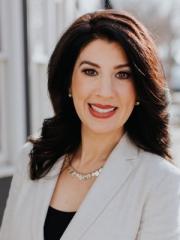
Desiree Chappell
MOM, CRNA and Host of The Roundtable Blog
Board of Directors, American Society of Enhanced Recovery (ASER). A passionate ambassador of Enhanced Recovery and Perioperative Care. Desiree is the creator of the popular Roundtable perioperative care blog: http://periopcareblog.com/
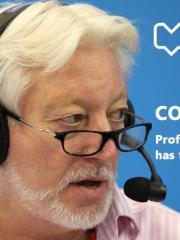
Prof. Monty Mythen
Co Founder and Editor In Chief of TopMedTalk
Monty is the Smiths Medical Professor of Anaesthesia and Critical Care at University College London and Adjunct Professor, Department of Anaesthesiology, Duke University, USA. Monty is also the founding Director of Evidence Based Perioperative Medicine International.

